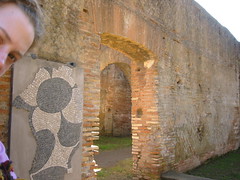A Reading Experience
I picked it off my parents' bookshelf. It was yellow and brittle, and the cover, designed by Milton Glaser, showed the blue profile of a shrewd-looking man, with red light falling on his nose and chin and where the whites of his eyes should have been. Someone had written "Ghost Motorcycle" on the title page, sideways.
I didn't know anything about the book-- the story, the setting, when Hesse had written it. Mostly I was intrigued by "ghost motorcycle" and what compelled some long ago reader to write those words on the inside of this book that now sat on my parents' shelf. It surely wasn't my mother or father--not their handwritings, not their idiosyncrasies.
I had only read one other book by Hesse, Siddhartha, but it didn't leave much of an impression on me. I was a distracted high school senior at the time, ready to leave the country. And the cover of this book gave away nothing-- the back copy was just piles of praise for Hesse. So I just dug in, as it should be.
I began reading Narcissus and Goldmund and was immediately engrossed by the medieval world and the innocent, young Goldmund. I enjoyed watching his internal evolution, though I found his teacher/friend Narcissus irritating (not that there is anything wrong with an unlikable character). Hesse writes philosophical novels and I bristled against his pitting art against philosophy, feeling against thought (can't art be logical? asked M when I told him about the book). The epiphanies at the end seemed to me forced, didactic, more rhetoric than human experience. But not entirely groundless, of course. Just needlessly simplified to make a point (methinks). I won't say whether art or philosophy wins, in case you plan on reading the book, but I don't think that would ruin the experience either way.
When I was in an early part of the novel, I asked my mother whether she had read it and she said once, in Romanian. A powerful book, she said, but she wouldn't read it again. At the time I hadn't reached the powerful parts (they are there)-- lust, love, and most important, the relationship we have with death and the creation of art. I would echo my mother's estimation. The book is most definitely worth a read, and not just for the sex and death, though they are the main players and the plague is one of the most haunting characters. But it is not going on my list of books to reread. I never found out what "ghost motorcycle" had to do with anything in the book (maybe nothing, maybe some odd mechanism for remembering a grocery list). Perhaps it was some connection only that reader and his or her experience could make with the book. That connection, that meeting of ideas between reader and writer, should be a relatively unique one. Perhaps that is what ultimately irritates me about didactic fiction, that I feel I'm being told what to think, what conclusions to make, rather than leading me to further thinking and my own conclusions. Ah well.
Subscribe to:
Post Comments (Atom)

No comments:
Post a Comment